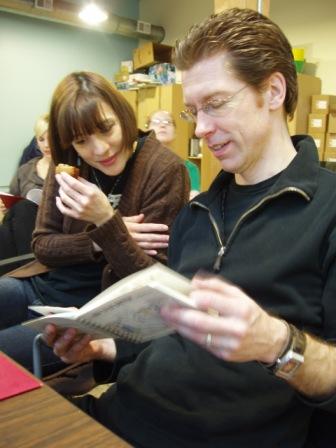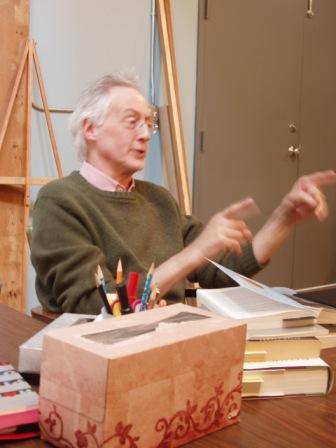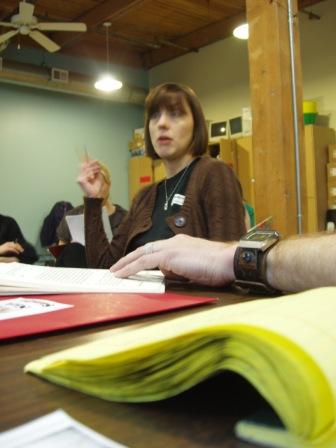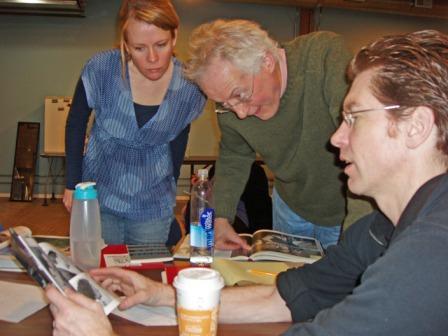Old Times Article
An Interview with Remy Bumppo about Old Times
By Kelli Marino, Dramaturg
Kelli Marino: As we wrap up Remy Bumppo’s 08-09 season exploring The Perils of Possession, we are about to begin rehearsals for Harold Pinter’s Old Times. I am sitting with Artistic Director James Bohnen, and Artistic Associates Linda Gillum and Nick Sandys who will be playing Anna and Deeley, respectively. I wanted to have a conversation with the three of you about Pinter’s Old Times.
 Linda Gillum and Nick Sandys in rehearsal for Old Times |
If you had one word to describe Pinter’s work, what would it be? And the word can not be Pinteresque or Pause.
(laughter)
Linda Gillum: Mysterious.
James Bohen: Poetic.
Nick Sandys: Structured.
KM: What are some of your favorite Pinter works?
NS: So many. I think The Homecoming, which is always the play that is anthologized of them all because it is such a great group play, and in some ways is the easiest to get into because the symbolism of the piece is clearest. I think The Caretaker is a terrific play, and even the early stuff like The Dumb Waiter which is just sort of fun with two gangsters stuck in a basement is just great. There are a great number of plays that I enjoy.
LG: I like Betrayal which is probably one of his most commercial works. It was one of the shows I worked on in school when I was directing; my first directing project. That is when I feel I fell in love with Pinter and wanted to start learning more about him. I use it when I teach and I kind of always come back to that play.
JB: It is a complicated response because the first time I remember sitting in a movie theatre in 1973 watching the American Film Institute’s and Peter Hall’s filmed version of The Homecoming with the original cast and just being, as Pinter might say, “Gobsmacked” by the language and energy and the subtlety and the austerity of it, even though someone could talk for four paragraphs and it would still feel austere. When Nick said “structured” and I said “poetic” at the beginning that is what, to me, that’s what his language does. He burns away everything else and leaves these central thoughts. But that having been said, I am drawn to the memory plays and to this play, Old Times, and very much to No Man’s Land, and I’m drawn to Betrayal as well even though I agree with Linda that it’s a little bit undervalued because of its commercial feeling, but I think it’s a brilliant play about the way people really are and complicated relationships. And this is going to sound like cheerleading but I also love the late political plays, the tiny political plays because they are so packed. Pinter’s career sort of aped Beckett’s. Beckett’s plays got shorter and shorter and more austere as he moved toward death, and I think Pinter was the same way. He kept burning away everything so he would write these little four minute or eleven minute plays that were like someone hitting you in the face with a Los Angeles phone book. They are just profoundly impactful, and yet nothing much happens in a conventional sense. I would have loved to have seen him do some of those. He made them very funny.
NS: He himself alwaystended towardsfunny in his own plays. I mean, his direction of No Man’s Land was extremely comedic. But, actually, to take issue with James slightly, there were also massive pieces at the end. Celebration, his last piece, was a huge partyin a short-ish play, butit ismultiple conversations going on all at the same time in a restaurant. It’s just kind of a massively complex. And then there is my favorite of his political plays, Mountain Language. It is like a fifteen minute play with twenty-eight people in it. No one can do it because you can’t afford to do it. But it’s a brilliant play about the language being eroded by a military coup.
KM: Do you think that it is the language that has given Pinter such lasting strength in modern theatre and a lasting resonation with audiences of the last fifty years?
LG: I think it is also what is not being said. I mean, I love Pinter’s language, but I found when working on my lines for this play, it is almost as if I stop speaking and there is still more to say. I am really intrigued by that. What am I thinking? What am I feeling? The subtext isn’t only in the pause, its is also in the continuation of a thought in my mind. I am just blown away by that.
NS: It is rare when you find a writer whose language is so spare and poetic, yet you know it’s all about subtext too. You have to balance them both; it is not all in the lineand not in betweenthe lines. They are both equally important. It is an amazing sort of challenge to deal with. I also think it’s about how he mysteriously taps into, like Albee and his great plays, the angst of modern life and just lets it bubble up. So though it may feel like his plays are mysterious with all these strange characters wandering around, we all feel the tension because we’ve all been to those places where that tension can be. It’s like he is writing about our own psyches but he’s putting it in mysterious, film noir places.
 James Bohnen in rehearsal |
JB: I think the other thing Pinter does is, and I don’t know how he does it, and I don’t think any other writer other than Beckett even attempts this, but he writes speeches that are absolutely structured like the most detailed chamber music, and yet it feels absolutely like natural speech. It works like this: if I want to tell you three little things, Pinter will write eleven sentences and the three things, one will be the second sentence, one will be the fifth sentence, and one will be the ninth sentence; that is the news. Pinter knows we dodge and weave, because we are afraid to say what we really mean or are using the language to bludgeon, or something, so we say something else. We have to pick through a paragraph and find that if we connect that, that, and that, we could have just said the news, but no one in Pinter ever just says the news whether they are talking a lot or a little. His characters will talk around the news. Pinter has an anchor in the indirect ways people communicate.
KM: But how strange is it that for everyone who knows Pinter, we would say that his dialogue is spare, but James just said that three things will take eleven sentences to say. I think that that juxtaposition is what makes Pinter inaccessible at times.
NS: I think it is that the spare-ness is in between those speeches. People will drop in a half sentence and then somebody will decide to take over, to do the power play of using language, which all of his plays are about, power in whatever way you want to use it, and suddenly they will say, “I am going to take over this room and I will do it with these lines.” By speaking more, they reveal more. They are trying to find the way of not revealing by using the language, but the language lets them down. There are these absolutely specific little holes that you have to find where you can go, “Wow, that’s a wormhole in that person’s psyche.” And we might not want to go there but it’s right there on the surface because they have led us into it because they opened their mouth. It is that balance of finding the moments when characters can’t bear the silence and so need to try and control it. That is what gets filtered down into that spare-ness.
KM: Old Times falls in with Pinter’s second group of plays known as the Memory Plays; can you speak to the significance that memory plays in this play? And to Pinter’s obsession with memory in any of this other works?
JB: Every time you actively think of a memory, to recapture an event in your brain, it dilutes it. That is the way memory works, and it gets looser and looser in its specificity even though you may be telling the story over and over again. But I think Pinter would argue that no one is in control of their own memories and no one can say with any true accuracy what happened to them, save what happened to them fourteen seconds ago. And I’m not sure we could even do that. So because you become unstuck in your own life, so to speak, I think he feels there is no reliable anchor for you to live other than to live in the present time. When we move a memory out of our storage, I really think Pinter believes that it is happening again, right now. You know the famous quote Pinter said to Mel Gussow about this play is “It all happens.” He doesn’t say “It all happened,” he says “It all happens. And that is all I know about the play. It all happens.” That is a little frightening and disconcerting.
NS: I was going to add something to what James was saying about memory. You know Anna has the great line about “There are things I remember which may never have happened, but as I recall them so they take place.” That gives you the sort of logic of it. Memory is a creative process and right from the beginnings of drama, memory is a structure for drama.So the idea of doing a play is built around the idea of memory. You are reenacting a previous person’s version of the story. It is always an active memory. You are memorizing your lines as an actor; you are remembering the story as a playwright. It is the core of theatre, that every performance is different; it is never the same, just as every memory changes. I think it’s sort of the same thing. It is vital to what we do. Everything we do is only as present as the current moment.
KM: That is a great line. Linda do you have anything to add to that?
LG: I am going to butcher a quote. It’s a Kahlil Gibranquote. “Today is but yesterday’s memory and tomorrow is today’s dream.” Is that right?
NS: Or the other way around.
 Linda Gillum in rehearsal |
LG: (laughing) I knew I was going to butcher it. It’s “Yesterday is but today’s memory, and tomorrow is today’s dream.” I like thinking about the truth in memory and what is true and what is not. You can really, really believe that what you remember is true, but the moment you share it with somebody who also participated in it, then who is telling the truth. What is the validity of the memory? They can both be true because that is where it lives and that is where it sits. In the play, it is kind of like a cycle because they keep coming back to the same memories and talking about how they all participated in that one event. They all think about it in a different way because you are living it and breathing it.
NS: Memory becomes a link to his political plays. It is interesting that memory is what the middle section of his life was and then he became more political. And Betrayal, being an ultimate memory play because it goes backwards in time, and we reinterpret everything because we are traveling in time in a different direction. The politics of it come straight out of memory. If you can remember something differently than someone else, you rewrite their life. You rewrite their story. You are in control of who they are, their identity.
JB: Particularly if you can persuade them.
NS: Exactly. And that leads right into his plays about fascist states trying to reorganize somebody’s life aroundtheir narrative. Memory is a way of using power. I think it’s really important in these plays. It is not just about marriage, it is about taking the power away from someone else and rewriting their story. Power writes the narrative.
JB: Right, if you take someone’s story away from them, you take their essence away. In the study guide we have the first chapter of Milan Kundera’s The Book of Laughter and Forgetting and the famous incident of Gottwald’s hat. Gottwald was a powerful figure in postwar Prague and was in a photograph of government officials wearing a fedora. Two years later he was out of favor and was removed from all the official photos, all of him except his hat, which ended up on someone else’s head. To me, that is Kundera’s great example: “If you can rewrite history by controlling a story that people can remember, then you win” for better or for worse.
KM: Let’s talk a bit about rewriting a story with the role of Carol Reed’s 1947 film Odd Man Out. In Old Times, the characters have an interesting dialogue about how they met while seeing a showing of Odd Man Out. What role does this movie take on in Old Times in the sense of power play and trying to reinvent each others’ histories?
NS: I think one of the keys is their ages. They were students when they met. We meet each other as students through pop culture, even though this film was filmed in 1947 and this play takes place in the 1970s, so they are seeing a revival of the film anyway. I think that it is really important. The title is fun, Odd Man Out — who is going to be the one left out? The idea of popular culture being a meeting for young people, but how much do you retain of pop culture. You get images from a film in the same way, but everybody remembers different images. So particularly when we are dealing with Carol Reed’s stuff, which is all about impression and chiaroscuro and theimpressions of faces and only seeing partial faces, the film is a wonderful image of this black and white version of themselves. They imagine themselves as these trendy, young people who they are no longer, and you get the idea of who they imagine themselves to be, though now they are middle aged.
JB: To carry that idea further, Deeley’s hero in the movie is Robert Newton’s character, who is the slightly off-center artist who only appears in the last third of the film. Many critics thought Robert Newton was acting in an entirely other movie. His performance was so over the top. But I have watched the movie about four times in the last month because I keep thinking about what it is that Deeley attaches so hard to Robert Newton. I think it is that clinging to the fact that he is an artist some how. Deeley says something like “the woman I met was sitting dead center in the movie theatre and I was slightly off center and I’ve been off center the rest of my life.” Yet, to knock Deeley off that post, your character Linda, Anna, picks out an even smaller character and says he was also very good. And that is an interesting choice too. (Anna picks out F.J. McCormick) This guy lives by his wits and makes himself up. But he does a generous act at the end of the film. He tries to get James Mason’s character Johnny McQueen, back to the priest. And he has been affected by the idea of faith. The film works on about a bazillion levels.
NS: It is fascinating because it is not a well known movie and is very difficult to get a hold of now. I love the fact that it never explains itself. It is a perfect, cryptic piece. It would make people run out a see Odd Man Out after they see the play thinking “I need to know about this movie.”
 Jenny McKnight, James Bohnen, and Nick Sandys in rehearsal for Old Times |
KM: As we close this interview, how do you Old Times tying in with Remy Bumppo’s “Perils of Possession” theme?
LG: I like the idea of possession. There are so many times in this play where it is two against one. Where it is two of them talking about the other as if they are not in the room but they are in the room. And it switches a lot. It is a very power play.
NS: Here is a twenty year marriage that is about to reach its midlife crisis as a result of this one night and this woman. It is an interesting idea of “Do you possess the other person in your life? Is there any way of possessing them? Is there any real ownership of that person? Is there any right you have over anything?” I think it is also connected to obsessing. This is something that haunts them all, this early relationship. It possesses them like a ghost possesses people. It lives with them however much they try to control the present moment. The past always possesses them.
JB: The season idea came from a sentence in a Michael Billington review of this play where he says he feels one of the things Pinter is exploring is that we don’t have the right to possess another human being. This play is very personal. The other two plays this season were much more in the public realm. Figaro deals with the class structure and Voysey dealt with the power in a community and possession of money and earthly goods. The season keeps telescoping down to a Petri dish of a farm house with two rooms where the three characters in Old Times are sitting in the same room at the same time. It is about how we choose to navigate in a seemingly monogamous relationship. How do we have a successful relationship that does not include possessing the other person in some way that takes power from them? The more you read the play, the more you think about the type of relationship that Kate and Deeley have. It is very hard to know where the power has been because Kate chooses to use her power so sparingly, yet so effectively when she does use it.
KM: Do you think that Old Times will resonate differently with today’s audiences and society than it did with the 1970s audiences?
JB: I think this play is utterly timeless. The play will speak to us today, but we need to speak it using the memories of Pinter’s London in that time.
NS: Pinter is so locked in to pop culture references that are under the surface. He is definitely talking about the world we are in now, so he writes it about theculture we are in now. But the way he then distills that and gets rid of the sort of chaff that we don’t need means that it is a universal picture of humanity.If you are doing No Man’s Land you’ve got to set it in the seventies, you can’t set it anywhere else. It affects the way the play is done. Or Betrayal, which is a late seventies, early eighties play, it’s got to be in that culture. And if you put it in a modern world, you sort of unmoor it. You can’t put a cell phone in any of these plays, it changes the play completely. You gotta have that sort of feeling that you can’t contact these people; you can’t communicate with people the way you communicate now. Today, we are changing the way we communicate all the time. Pinter’s plays are about communication.
JB: And the time it takes to communicate. I think that is an important issue.
KM: OK. So Pinter’s plays are about communication and power. We are going to leave it there!
